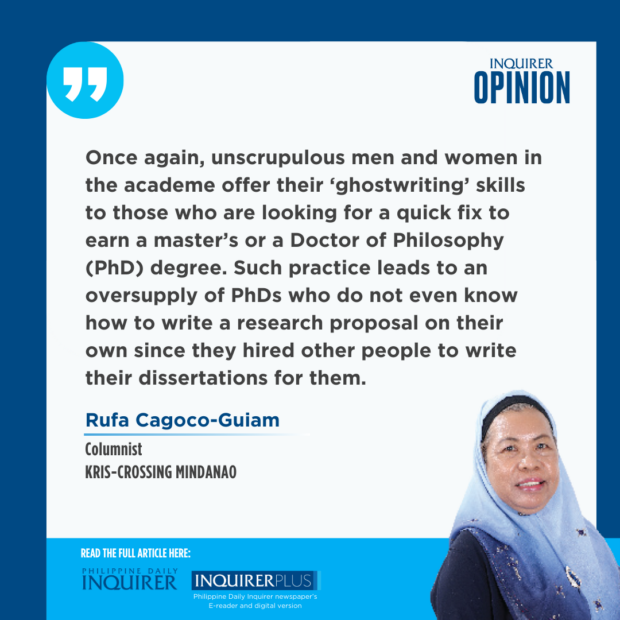‘Publish or perish’ (2)

My former colleagues at a state university here in Mindanao have always complained that with the heavy teaching loads they have (some say as much as 40 units per semester, translated to at least 10 teaching hours every day), they can no longer engage in meaningful academic pursuits like doing research. So publication is out of the question.
Academic leaders always invoke that research is one of the three basic functions of academics, especially those facilitating learning among adult learners in higher educational institutions (HEIs). The two other core functions are teaching/instruction and extension work. Given the heavy teaching loads assigned to university lecturers and professors, they can only do justice to one—instruction.
However, universities must consider that they are assessed yearly through their respective accreditation agencies that evaluate the quality of instruction, extension work, and relevant research that HEIs are required to do to be elevated to a higher level of accreditation status. Higher accreditation status means universities are given “autonomous” prerogatives to offer more courses and degree programs as well as to claim they are certified to deliver quality education to their students. This increases their “marketability” among parents who want to ensure their children are provided quality education that is usually used as a gauge for accessing better-paying jobs offered by various industrial or even academic institutions.
Some university officials offer incentives for professors who engage in research in terms of providing cash support for “internally funded” studies and award them with “productivity” bonuses. In addition, these professors also get promoted to the next academic rank based on the number of research they have conducted, and more if the results of these studies are written and published in peer-reviewed or Scopus journals as I mentioned in last week’s column.
However, such incentives only led to some professors taking shortcuts on the journey toward their promotion. This includes getting substandard quality of research and equally poorly written articles that show sloppy methods of designing research and methodology, including simplistic frameworks for analysis. Some professors have even resorted to gathering data from dubious sources and reference materials that are more easily accessible than peer-reviewed journals that are exclusive to those who have subscribed to them. But subscription fees to these type of journals are quite prohibitive, so poorly paid college teachers or professors do not have access to these type of journals.
In the academe, it is important that professors not only get to publish the results of their studies but also that their publications have been cited by other scholars in their own field of specialization. Academicians these days are also concerned with the number of citations their publications have generated. The more often their publications have been cited and acknowledged as having contributed to the scholarship in any academic field, the more rewarded they are in terms of promotion to the next higher academic rank. But again, this also becomes another avenue for false claims. For instance, one Mindanao-based academic has claimed to be among the “most cited” authors in his field on social media. This prompted netizens to uncover the bases for claiming such and realized that the citations he mentioned were all objections to the kind of substandard type of research he did and his equally sloppy writing. In short, the citations proved that he did not do quality research that can be considered in a peer-reviewed journal. Still, the numerous citations he claimed made him assert his ascendancy (and arrogance) as a professor who has achieved scholarly status in his field.
Perhaps one of the most controversial issues in the academe these days is the rush to obtain the most advanced degree in higher education—getting a doctorate. This is exacerbated by government requirements for hiring people to high positions in both local and regional bureaucracies. Once again, unscrupulous men and women in the academe offer their “ghostwriting” skills to those who are looking for a quick fix to earn a master’s or a Doctor of Philosophy (Ph.D.) degree. Such practice leads to an oversupply of Ph.D.s who do not even know how to write a research proposal on their own since they hired other people to write their dissertations for them. This also raises an unfair situation among Ph.D. students who do not have sufficient funds to support their advanced studies.
In all these cases, we can see that the academe is no longer impervious to the academe. And it is all because of the reality of competition in almost all academic institutions to produce more graduate students, and for these graduates to publish their work—otherwise you “perish” as a legitimate member of the academic institution.
—————–
rcguiam@gmail.com




















